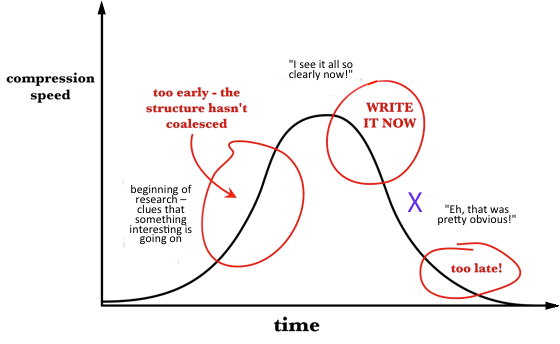August 26, 2017 12:02 PM
"You Are Here"

This graph illustrates one of the problems that afflicts me as a writer. Too often, I don't have the confidence (or gumption) to start writing until I reach the X. By that time in the learning cycle, downhill momentum is significant. It's easier not to write, either because I figure what I have to say is old news or because my mind has moved on to another topic.
I am thankful that other people share their learning at the top of the curve.
~~~~
Sarah Perry. created the above image for one of her many fine essays. I came upon it in David Chapman's Ignorant, Irrelevant, and Inscrutable. The blue X is mine.
August 14, 2017 1:42 PM
Papert 1: Mathophobia, Affect, Physicality, and Love
I have finally started reading Mindstorms. I hope to write short reflections as I complete every few pages or anytime I come across something I feel compelled to write about in the moment. This is the first entry in the imagined series.
In the introduction, Papert says:
We shall see again and again that the consequences of mathophobia go far beyond obstructing the learning of mathematics and science. The interact with other endemic "cultural toxins", for example, with popular theories of aptitudes, to contaminate peoples' images of themselves as learners. Difficulty with school math is often the first step of an invasive intellectual process that leads us all to define ourselves as bundles of aptitudes and ineptitudes, as being "mathematical" or "not mathematical", "artistic" or "not artistic", "musical" or "not musical", "profound" or "superficial", "intelligent" or "dumb". Thus deficiency becomes identity, and learning is transformed from the early child's free exploration of the world to a chore beset by insecurities and self-imposed restrictions.
This invasive intellectual process has often deeply affected potential computer science students long before they reach the university. I would love to see Papert's dream made real early enough that young people can imagine being a computer scientist earlier. It's hard to throw of the shackles after they take hold.
The thing that sticks out as I read the first few pages of Mindstorms is its focus on the power of affect in learning. I don't recall conscious attention to my affect having much of a role in my education; it seems I was in a continual state of "cool, I get to learn something". I didn't realize at the time just what good fortune it was to have that as a default orientation.
I'm also struck by Papert's focus on the role of physicality in learning, how we often learn best when the knowledge has a concrete manifestation in our world. I'll have to think about this more... Looking back now, abstraction always seemed natural to me.
Papert's talk of love -- falling in love with the thing we learn about, but also with the thing we use to learn it -- doesn't surprise me. I know these feelings well, even from the earliest experiences I had in kindergarten.
An outside connection that I will revisit: Frank Oppenheimer's exploratorium, an aspiration I learned about from Alan Kay. What would a computational exploratorium look like?
August 11, 2017 9:08 AM
Don't Say "Straightforward" So Often, Obviously
This bullet point from @jessitron's Hyperproductive Development really connected with me:
As the host symbiont who lives and breathes the system: strike the words "just", "easy", "obvious", "simple", and "straightforward" from your vocabulary. These words are contextual, and no other human shares your context.
My first experience coming to grips with my use of these words was not in software development, but in the classroom. "Obvious" has never been a big part of my vocabulary, but I started to notice a few years ago how often I said "just", "easy", and "simple" in class and wrote them in my lecture notes. Since then, I have worked hard to cut back sharply on my uses of these minimizers in both spoken and written interactions with my students. I am not always successful, of course, but I am more aware now and frequently catch myself before speaking, or in the act of writing.
I find that I still use "straightforward" quite often these days. Often, I use it to express contrast explicitly, something to the effect, "This won't necessarily be easy, but at least it's straightforward." By this I mean that some problem or task may require hard work, but at least the steps they need to perform should be clear. I wonder now, though, whether students always take it this way, even when expressed explicitly. Maybe they hear me minimizing the task head, not putting the challenge they face into context.
Used habitually, even with good intentions, a word like "straightforward" can become a crutch, a substitute minimizer. It lets me to be lazy when I try to summarize a process or to encourage students when things get difficult. I'm going to try this fall to be more sensitive to my use of "straightforward" and see if I can't find a better way in most situations.
As for the blog post that prompted this reflection, Hyperproductive Development summarizes as effectively as anything I've read the truth behind the idea that some programmers are so much more effective than others: "it isn't the developers, so much as the situation". It's a good piece, well worth a quick read.